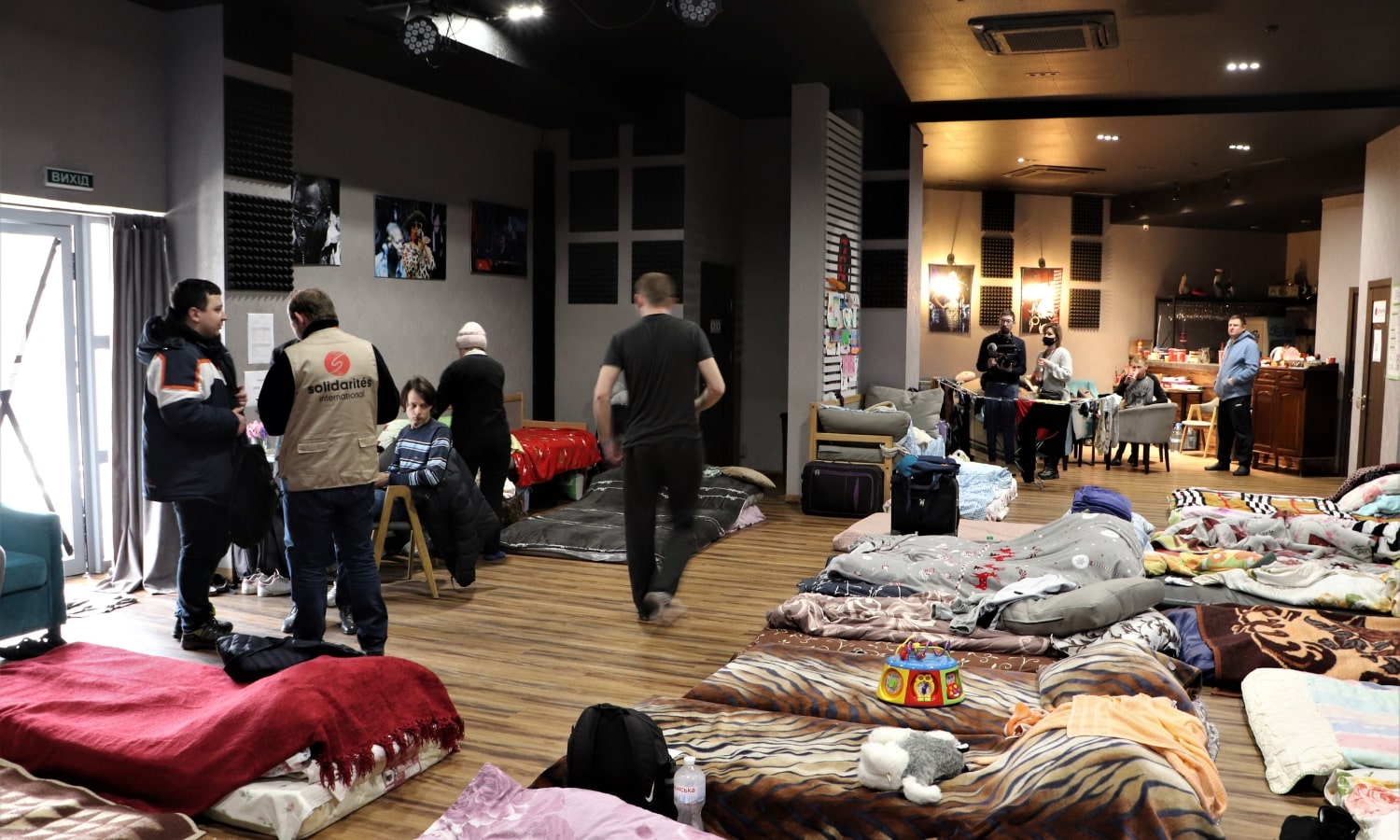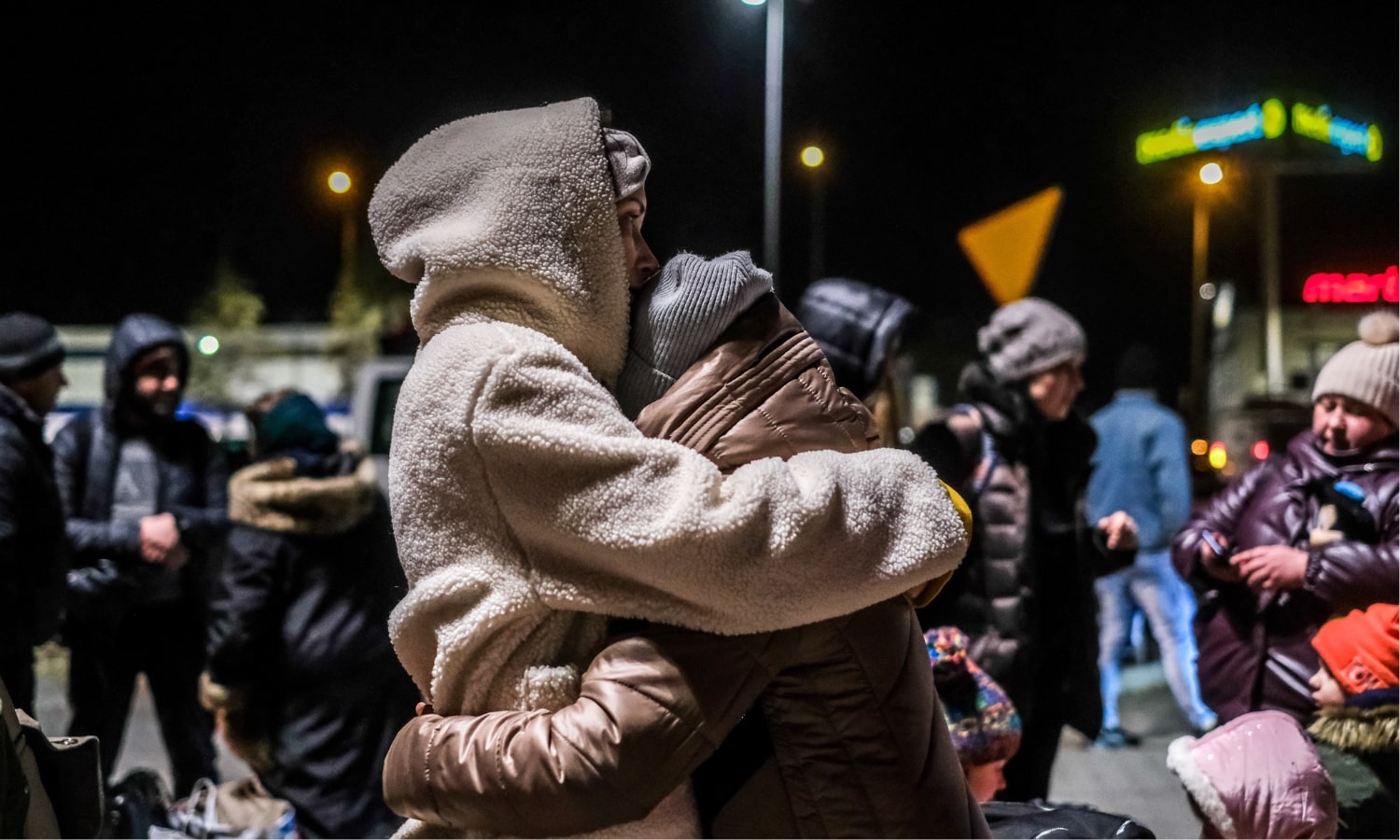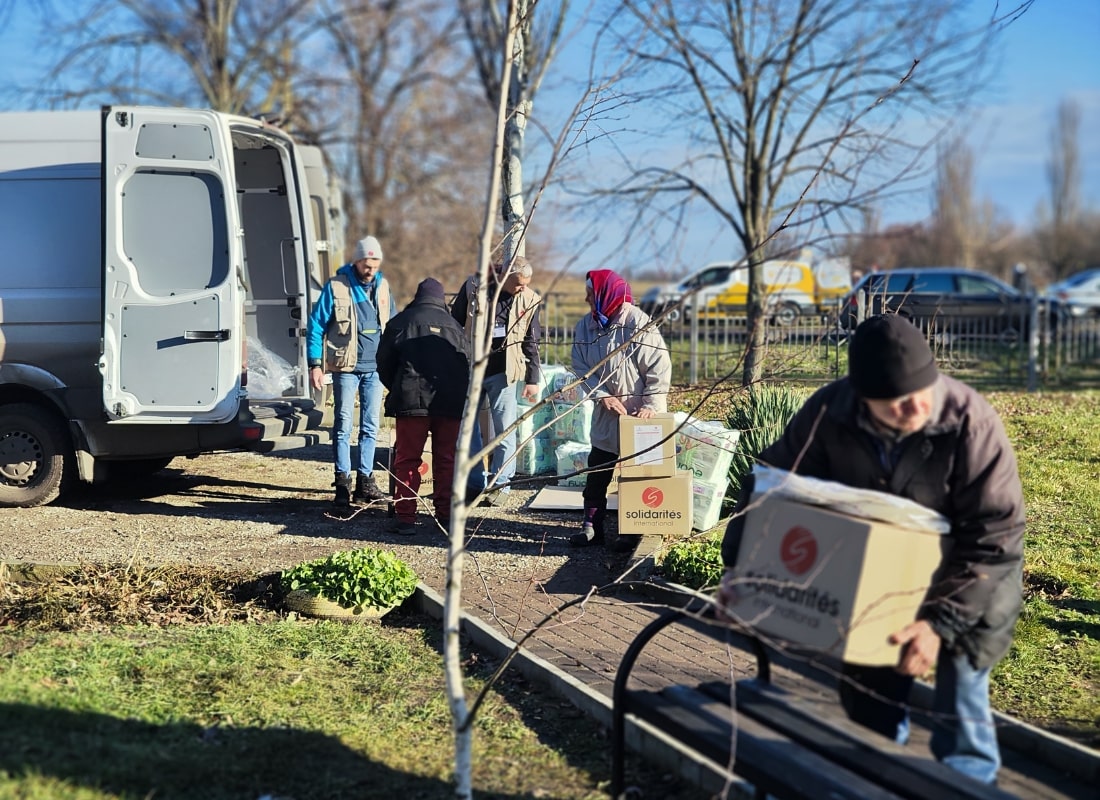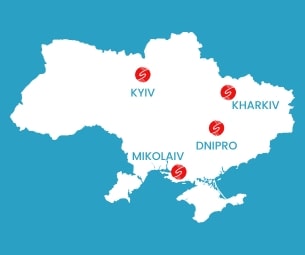On 24 February 2022 Vladimir Putin announced on the Russian television: « I have made a decision to carry out a special army operation. » From that day the offensive against Ukraine was launched. Two years later more than 30, 000 civilians have died, 3, 700, 000 people have been displaced inside the country and 17, 600, 000 people need humanitarian aid.
On the day of this sad anniversary Philippe Bonnet, the director of the emergency department for SOLIDARITÉS INTERNATIONAL, is recalling how the work of the NGO in Ukraine was set up and tells about his arrival in the country. He gives an account of the hallucinatory vision he had of a country under the shock of the aggression that has just started, while driving across it.
« I am crossing the Polish border to reach Lviv on 28 February with Vianney, the logistician of the emergency team. Kiev is emptying of its inhabitants. People are fleeing towards Poland. Continuous streams of cars between Kiev and the border are causing tremendous traffic jams. 20 kilometres of cars are queueing up, sometimes left there by people who finally crossed the border on foot. The town is invaded by tens of thousands of displaced people (70,000 per day according to the authorities) who are turning up to the station where a whole bunch of Ukrainian volunteers in buses and trucks drive them to the Polish border or take them in in centres.
At that time of the conflict everybody thinks that that is the end of it, that the Russians are coming, so they must leave Ukraine. All the NGO apply themselves to evacuate their employees. I call a colleague from another NGO to ask information about the best way to cross the country. She says to me: « You must be mad! Why are you going in? » The area is very militarized. There are checkpoints and sandbags at every street crossing, people in arms, even armed civilians. It is winter. The Ukrainian landscapes, everything is black and white. An apocalyptic atmosphere really pervades all the country.
Right from the beginning we get in touch with a local provider who is a social contractor who takes beaten women in and gives them a job. As he manages institutional catering, we give him money to provide all the families who are fleeing the fighting areas and who are landing up in Lviv station square, with hot meals and drinks.
Very early Ukrainian men are not allowed to leave their country. As a result, many families decide to remain together and to stay in Ukraine. They are given accommodation in stadiums, in public centres, in schools and so on. We help these centres to take them in. »
Ukraine
Context and action- 37 million inhabitants
- 77th out of 191 countries on the Human Development Index
- 501,843 people rescued since march 2022

Photo : © SOLIDARITÉS INTERNATIONAL
Being present on displaced people’s way
After some days our analysis of the situation is getting refined, and we are thinking now that we are going to go further east. The road is completely empty, but the opposite lanes are full of people who are fleeing. We stop in Ouman, a town in the centre of the country. It is dismal there. At night black-out is imposed, which means that you must not switch on the lights so as not to let the Russians air force spot the towns. All is dark. Some soldiers patrol the streets to admonish those who leave the light on or do not draw their curtain. It is 15 degrees below zero outside. The members of the Town Hall are barricading themselves with sandbags, machine guns and are turning the place into a bunker. People are making Molotov cocktails by emptying bottles of alcohol.
We meet a very singular woman, Galina, whose name alone allows us to go through every checkpoint. She manages the public centres in which people who are fleeing stop sometimes just for one night before going on their way. Inhabitants from Mariupol and from other areas where the fighting is raging arrive in bullet-riddled cars transporting children and sometimes wounded people. The public centre directs them. As in Lviv we finance food purchase and the production cost of hot meals via the town hall canteen. People arrive there in the evening; they are served a hot meal and leave the place the following day with one little snack and one bottle of water each to continue their route. At that very moment, we are still the only international NGO on the spot. Our presence gives people new hope: they do not feel abandoned.

Photo : © Michael Bunel
Closest to the frontline
In mid-March our fixer refuses to go further because he is scared. He goes back to Lviv to assist the extra helpers who have taken over from us. We meet a man who is still working with us and who agrees to take us to Odessa and to Mikolaiv, a town which at that time is completely surrounded by the Russians. Of course, there is nothing left in this town. Thanks to a a little local religious association we manage to send food kits there.
From Odessa we organize a small operation bound for the town of Berdiansk which is already occupied by the Russian army. We manage to send 14 tons of food in this town thanks to a network of smugglers who succeed in crossing the front line. After that we go to Dnipro then we start working on the east front line, the emergency team’s priority, while the mission is developing in the other areas. First interventions take place in Porkrovsk to stock up the air-raid shelters with water, food and basic essentials. Similar actions are carried out in Kramatorsk and in Nikopol.
On the front lines the number of old people who refuse to go away, who prefer dying in the cellars of their bombed houses rather than end up in a public centre in another area, is more important than anywhere else.
In early April we intervene for the first time in Kharkiv which is practically surrounded by the Russian army; only one line allows us to enter the western part of the town. The inhabitants who have not fled live in the underground to shelter from bombing. We start our operations there. We reach the place driving our convoys we park in front of the metro entrances. We unload the trucks in the underground, we run In the underground, on the platforms there live hundreds of families with their sleeping bags and their mattresses, the valuable objects they could take with them. Outside artillery is roaring. We bring them water; we rehabilitate water filtering systems and we also give the children Monopoly games and other games. We also hand out hygiene kits. With a man called Sacha who runs a network of volunteers who deliver meals to people who have stayed in the town, we use the underground networks to reach various populations. We bring basic essentials to those who have not gone down into the underground, most of them old people who are staying in the cellars of their blocks of flats. It is extremely dangerous because Kharkiv is regularly bombed then. Two years later incidents are still taking place in Kharkiv but in those times the Russians’ ambition was still to take the town and their artillery was utterly devastating among the civilians.
Little by little the landscape is changing, the countryside is growing green again. In Kharkiv the underground is getting empty. Displaced people and refugees are even going back home when everybody understands that Ukraine does not give up and that consequently our actions are definitely going to last for an unlimited period. Strong partnerships are established between us and the Ukrainian civil society who is getting organized. Our mission is developing a structure, its organization is improving, and we are recruiting more and more Ukrainian colleagues. The emergency phase is coming to an end: it will have to be replaced by other types of activities. Some months later, in September, we even start supporting the families who are going back into the areas recaptured by the Ukrainian army south-east of Kharkiv and in the area of Kherson at the end of the year.
2024: A mission adapted to the ukrainian’s needs
In February 2024 the nature of the mission carried out by SOLIDARITÉS INTERNATIONAL has evolved. As the number of people in transit has gone down, Lviv and Ouman bases have been closed and the strategy has been redirected so as to bring increased help to the villages near the conflict zones in the east and south of the country. There SOLIDARITÉS INTERNATIONAL supports house repairing and ensures access to drinking water as well as to the most basic essentials proper to households’ life. In the areas which used to be under Russian occupation, our teams support the local authorities with providing public services, especially water. That is the condition for the 10 million people who have not gone back home yet to return home with dignity.
In the areas regularly affected by bombing in the east of the country where SOLIDARITÉS INTERNATIONAL intervenes, the temperature falls to 30 degrees below zero in winter. Because Ukraine is dependent on its Soviet past, it has the distinctive feature of having a specific public heating system, enormous heating stations, which is one of the Russians’favourite targets so as to undermine people’s spirits. Under these conditions the cut of a pipe or the destruction of a station are enough to deprive a whole district of water and heating. As a result, activities dealing with sheltering the populations in winter are most crucial. Thus, SOLIDARITÉS INTERNATIONAL distributes briquettes of sunflower remnants meant to be burnt as firewood to several thousands of households who get one ton of them each. At the same time house repairing actions are carried out and our NGO deals money intended to provide for blankets and coats.
After two years’ war the Ukrainian people has developed specific competences. Now they are able to identify the sounds indicating that artillery is leaving or arriving as they can assess distance, danger and the appropriate behaviour to be adopted. These people who often have no place to go had no choice but to adapt themselves to circumstances. The population has shown much resilience and puts up with the situation. For all that, the violence of fighting has remained unchanged, as for instance in the martyred town of Avdiivka which has become the epicentre of Russian current attacks. The future remains very uncertain.

Photo : © SOLIDARITÉS INTERNATIONAL

